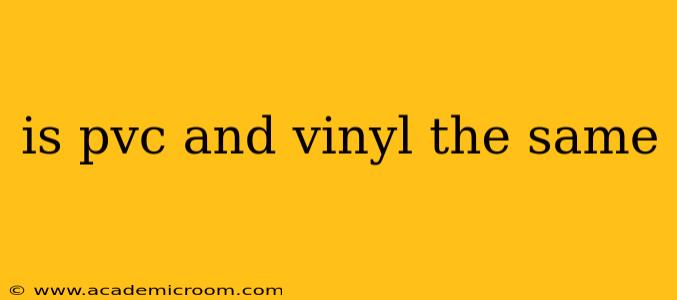The terms "PVC" and "vinyl" are often used interchangeably, leading to confusion. While closely related, they aren't exactly the same thing. This article will clarify the relationship between PVC and vinyl, explaining their similarities and differences.
What is PVC?
PVC stands for polyvinyl chloride. It's a specific type of plastic polymer made from the polymerization of vinyl chloride monomers. Think of it as a precise chemical formula. PVC is a durable, versatile material used in a wide range of applications, from pipes and flooring to window frames and medical devices. Its properties, including its strength, flexibility (depending on additives), and resistance to chemicals and weathering, make it highly sought after in various industries.
What is Vinyl?
"Vinyl" is a more general term referring to a family of polymers based on vinyl monomers. It's essentially the broader category that encompasses PVC and other related materials. You can think of "vinyl" as the general classification, with PVC being one specific member of that family. Vinyl can refer to a variety of products, including records (made of polyvinyl acetate), flooring, siding, and more. The key is that they all contain a vinyl group—a carbon atom double-bonded to a carbon atom and single-bonded to another atom, typically a hydrogen atom.
So, are PVC and Vinyl the Same?
The short answer is no, but it's a nuanced relationship. PVC is a type of vinyl, but not all vinyl is PVC. It's like saying a square is a rectangle, but not all rectangles are squares. PVC is a specific polymer with a particular chemical structure, while vinyl is a broader classification encompassing various polymers based on vinyl monomers.
What are the differences in their uses?
The differences in use often stem from the properties of each vinyl type. PVC, with its durability and resistance to chemicals, is favoured for construction, plumbing, and medical applications. Other vinyl types, like polyvinyl acetate (used in records), may have different properties better suited to specific needs.
How are PVC and vinyl similar?
Both PVC and other vinyl polymers share a common chemical base – the vinyl group. This gives them some common characteristics such as relatively low cost, easy processing, and varying degrees of flexibility and durability depending on the additives.
Frequently Asked Questions (FAQ)
Here are some common questions people ask about PVC and vinyl:
Is PVC toxic?
PVC production and processing can involve the release of harmful substances, and some additives used to modify its properties may also have health concerns. However, properly manufactured and handled PVC products generally pose minimal risk. This includes the leaching of hazardous components. Concerns arise more with the production and disposal processes than with the finished product's usage.
Is vinyl environmentally friendly?
The environmental impact of vinyl products is a complex issue. PVC's durability contributes to its longevity, reducing the need for frequent replacements. However, its production and disposal can have negative environmental consequences, particularly concerning the release of dioxins. Alternatives, and responsible recycling are crucial for minimizing the environmental impact of vinyl products.
What is the difference between PVC and vinyl siding?
Vinyl siding is a common application of PVC. While some vinyl siding may be made from other vinyl polymers, a significant portion of vinyl siding on the market is made from PVC due to its weather resistance and durability.
This clarification should help differentiate between PVC and vinyl. While they are related, understanding their distinct characteristics is crucial for making informed decisions about their applications and potential impacts. Remember to always consult the manufacturer's information for specific product details and safety guidelines.
